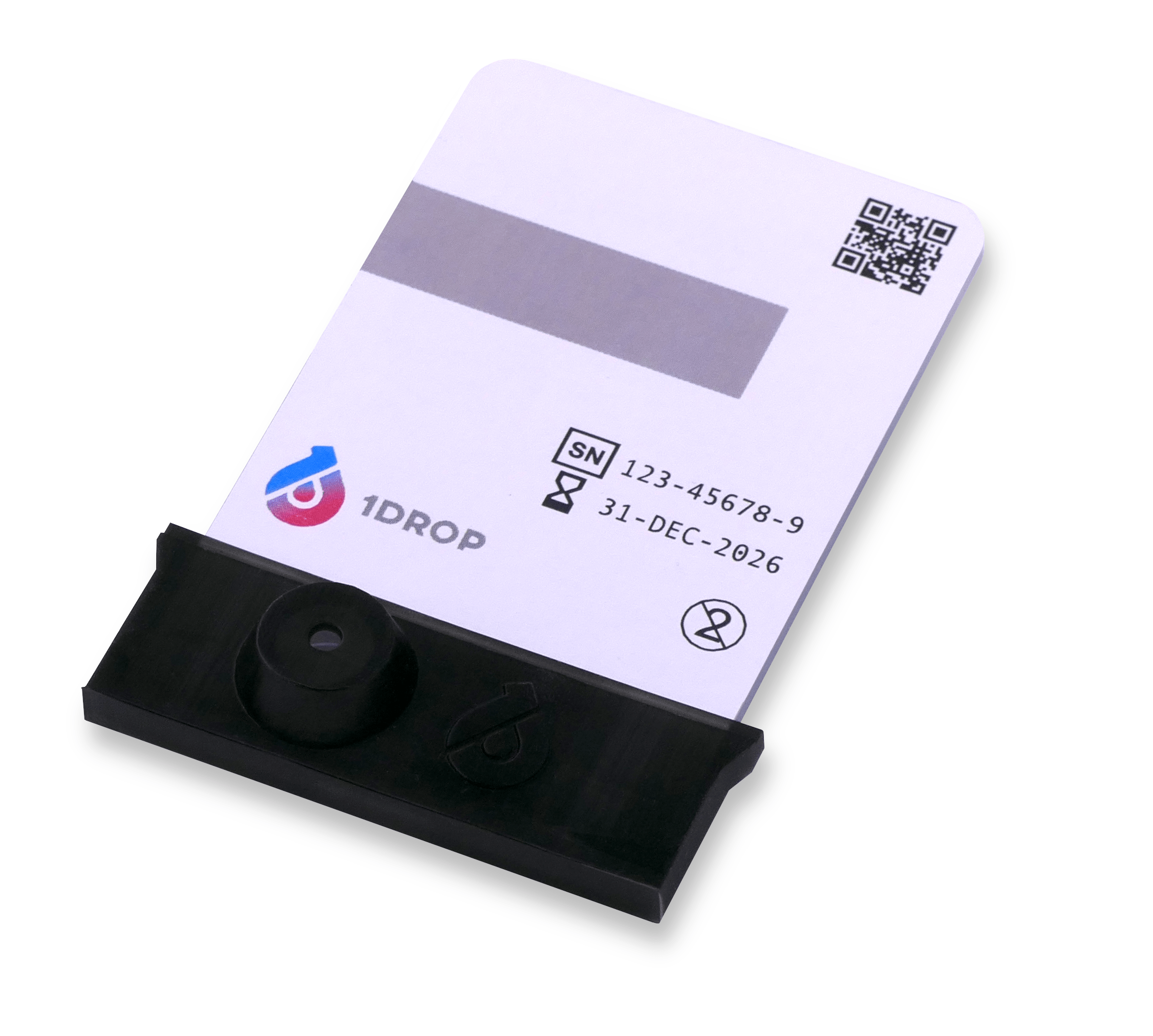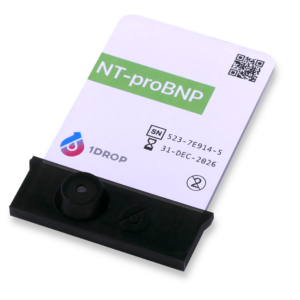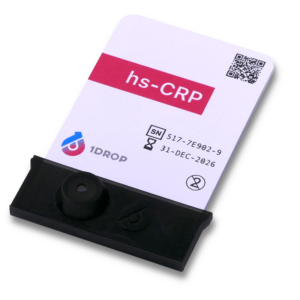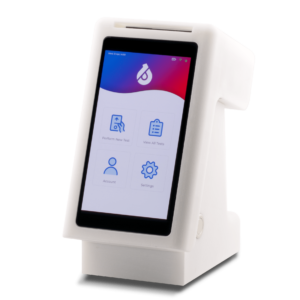Thyroid-Stimulating Hormone (TSH)
CHF 49.00
Thyroid Stimulating Hormone is produced by the pituitary gland and regulates the thyroid’s hormone production. This test aids in diagnosing thyroid disorders such as hypo- and hyperthyroidism, allowing for timely and tailored treatment to maintain thyroid health.
This is a pre-order product. We plan FDA 510(k) Clearance in North America and CE Mark in Europe in Q4 2024. We plan to start shipping in Q1 2025.
Capillary Blood Sample
Finger prick collection
Age 18+
15 minutes time to result
About the test
The TSH Test assesses the function of the thyroid gland. The thyroid gland plays a crucial role in regulating the body’s metabolism and energy production. TSH is a hormone produced by the pituitary gland that stimulates the thyroid gland to produce hormones such as thyroxine (T4) and triiodothyronine (T3).
The TSH test measures the level of TSH in the blood. Abnormal TSH levels can indicate various thyroid disorders, such as hypothyroidism (underactive thyroid) or hyperthyroidism (overactive thyroid). A high TSH level usually suggests an underactive thyroid, while a low TSH level indicates an overactive thyroid. This test is essential for diagnosing thyroid conditions and monitoring the effectiveness of thyroid treatment. It is often ordered alongside other thyroid function tests to provide a comprehensive assessment of thyroid health.
Who should take this test
This test is recommended for individuals with these conditions:
- Symptoms of Thyroid Dysfunction: unexplained weight changes, fatigue, sensitivity to cold or heat, changes in heart rate, hair loss, dry skin, mood swings, and muscle weakness.
- Family History of Thyroid Disorders : your risk of developing similar conditions might be higher. Regular thyroid testing can help detect potential problems.
- Monitoring Thyroid Conditions: Individuals diagnosed with a thyroid disorder may undergo regular TSH testing to monitor the effectiveness of treatment and adjust medication.
- Pregnancy: Thyroid function can change during pregnancy, and thyroid disorders can affect both the mother and the developing fetus. Pregnant women with a history of thyroid disorders or those who develop symptoms during pregnancy.
- Heart Conditions: Thyroid dysfunction can impact heart health. People with heart conditions, particularly with symptoms of thyroid dysfunction, might be recommended to undergo thyroid testing.
- Unexplained Health Issues: If you have health problems that are difficult to diagnose or explain, a thyroid disorder could potentially be an underlying cause.
- Medication Monitoring: Certain medications, such as those used to treat bipolar disorder or certain heart conditions, can affect thyroid function.
- Preventive Health Screening: Some healthcare providers may include thyroid testing as part of routine health checkups to catch any potential issues early.
What’s tested
This test specifically measures the concentration of TSH in your blood. TSH is produced by the pituitary gland, a small gland located at the base of your brain. Its primary function is to stimulate the thyroid gland, which is located in your neck, to produce thyroid hormones. The two main thyroid hormones are thyroxine (T4) and triiodothyronine (T3), which play essential roles in regulating your metabolism, energy production, and overall bodily functions.
The TSH test is commonly used as an initial screening tool for thyroid disorders. Depending on the results of the TSH test, further testing, such as measuring T3 and T4 hormone levels, might be recommended to provide a comprehensive assessment of thyroid health.
TSH levels can be influenced by various factors, including age, sex, pregnancy, medications, and other medical conditions. Therefore, healthcare professionals interpret the test results within the context of your individual health profile to make accurate diagnoses and treatment recommendations.
Signs and Symptoms
Thyroid disorders can lead to a variety of signs and symptoms, which can vary based on whether the thyroid is overactive (hyperthyroidism) or underactive (hypothyroidism). Here’s a breakdown of common signs and symptoms associated with each:
Hypothyroidism (Underactive Thyroid):
• Fatigue and low energy
• Weight gain or difficulty losing weight
• Cold sensitivity
• Dry skin and brittle nails
• Constipation
• Hair loss or thinning
• Muscle aches and weakness
• Elevated cholesterol levels
• Slowed heart rate
• Forgetfulness and difficulty concentrating
• Depressed mood
• Irregular or heavier menstrual periods
• Hoarse voice
Hyperthyroidism (Overactive Thyroid):
• Rapid heartbeat or palpitations
• Unexplained weight loss, despite increased appetite
• Heat intolerance and excessive sweating
• Nervousness and anxiety
• Tremors or shaky hands
• Difficulty sleeping
• Increased bowel movements or diarrhea
• Muscle weakness
• Bulging eyes (Graves’ disease)
• Swollen thyroid gland (goiter)
• Lighter or missed menstrual periods
• Thinning skin
Eligibility
The TSH Test is available for anyone over the age of 18 who exhibit symptoms or risk factors associated with thyroid dysfunction.
Before your Test
No special preparation is needed for this test. Fasting is not necessary.
After your Test
Your test results will be available in the 1DROP App and patient portal on the website, tablet or computer. You will receive a comprehensive and easy-to-understand report. You will be alerted if your results are outside the normal ranges.
Interpret the Results
Here’s how to interpret the results:
1. Normal Range: between 0.4 to 4.0 mU/L is normal for adults. This range can vary based on factors such as age, pregnancy, and underlying health conditions.
2. Low TSH Level:
• Below the normal range may indicate an overactive thyroid (hyperthyroidism).
• Hyperthyroidism can result from conditions like Graves’ disease, toxic multinodular goiter, or thyroiditis.
• Low TSH levels often correlate with elevated levels of thyroid hormones (T3 and T4).
3. High TSH Level:
• Above the normal range may suggest an underactive thyroid (hypothyroidism).
• Hypothyroidism can be caused by conditions like Hashimoto’s thyroiditis, iodine deficiency, or thyroid surgery.
• High TSH levels typically accompany low levels of thyroid hormones (T3 and T4).
4. Context:
• TSH levels should be interpreted alongside clinical symptoms and additional thyroid function tests, such as Free T3 (FT3) and Free T4 (FT4) measurements.
• For example, if TSH is high and FT4 is low, this may indicate primary hypothyroidism. If TSH is low and FT4 is high, this may indicate primary hyperthyroidism.
5. Monitoring and Follow-Up:
• Abnormal TSH levels may require further testing and monitoring over time to assess trends and make treatment decisions.
HOW IT WORKS
Order online test anywhere

Choose Your Tests
Shop for tests on the 1DROP website or App. Order your tests and they will be shipped to you.

Test Your Sample
Insert the Chip into the Reader. Collect a finger prick of blood and place it on the Chip. The 1DROP Reader analyzes your sample within 15 minutes.

View Your Results
View your test results on the secure and private patient portal on your smartphone, tablet or computer. Easily share your results with your doctor, family, friends. Obtain guidance on your next steps.
BENEFITS
Take control of your health
Easy, rapid, affordable home testing
Convenient and Fast
Easy to Use and Understand
Personalized
Reduce Preanalytical Error
Private & Secure
Actionable Health Information
QUESTIONS
1. How common are thyroid disorders hypothyroidism or hyperthyroidism?
Thyroid disorders are relatively common, and both hypothyroidism and hyperthyroidism affect a significant number of individuals worldwide. The prevalence of these conditions can vary by population, age, gender, and geographical location.
Here’s an overview of how common these thyroid disorders are:
Hypothyroidism (Underactive Thyroid):
• Hypothyroidism is more common than hyperthyroidism, particularly among older individuals.
• It’s estimated that hypothyroidism affects more than 5% of the population.
• The prevalence increases with age, affecting around 18% of people aged 65 and older.
• Women are more likely to develop hypothyroidism than men.
• Worldwide, iodine deficiency remains one of the leading causes of hypothyroidism in certain regions.
Hyperthyroidism (Overactive Thyroid):
• Hyperthyroidism is less common than hypothyroidism but still prevalent.
• Hyperthyroidism affects about 1.5% of the population.
• The prevalence tends to be higher among women than men.
• Graves’ disease is the most common cause of hyperthyroidism, accounting for a significant portion of cases.
Thyroid disorders can sometimes be asymptomatic or have vague symptoms, not everyone with a thyroid disorder may be diagnosed. Regular medical checkups, especially if you have a family history of thyroid disorders or experience symptoms associated with thyroid dysfunction, can help with early detection and proper management.
2. How often should I check my thyroid function?
The frequency of thyroid function testing depends on your health status and risk factors:
1. No Known Issues: testing every 1 to 5 years during routine checkups can be sufficient.
2. Symptoms or Risk Factors: more frequent testing may be recommended.
3. Pregnancy: Pregnant women need regular testing due to thyroid’s impact on fetal development.
4. Medication or Treatment: Those on thyroid medication or treatment require regular monitoring.
5. Aging: Risk increases with age, especially after 50, suggesting regular testing.
3. What are the risk factors for developing thyroid disease?
Several risk factors can increase the likelihood of developing thyroid disease, including both hypothyroidism (underactive thyroid) and hyperthyroidism (overactive thyroid). Having one or more risk factors does not guarantee that you will develop thyroid disease, but they might increase your susceptibility. Here are common risk factors to consider:
1. Family History: Especially autoimmune thyroid conditions like Hashimoto’s thyroiditis and Graves’ disease.
2. Gender: Thyroid disorders are more common in women than in men. Pregnancy and menopause can impact thyroid health.
3. Age: Risk increases with age. Hypothyroidism is more likely to develop in older adults, while hyperthyroidism often emerges in younger adults.
4. Autoimmune Conditions: such as type 1 diabetes, rheumatoid arthritis
5. Iodine Intake: In regions with insufficient dietary iodine or excessive iodine intake, the risk of thyroid disorders, particularly hypothyroidism, can be elevated.
6. Pregnancy: Pregnancy-related hormonal changes can affect thyroid function. Women with a history of thyroid issues or those with postpartum thyroiditis.
8. Radiation Exposure: Exposure to ionizing radiation, especially during childhood, can raise the risk of thyroid cancer and thyroid nodules. Individuals who received radiation therapy to the head and neck during childhood for conditions like Hodgkin’s lymphoma or tonsillar enlargement.
8. Medications: Certain medications, like lithium and amiodarone, can affect thyroid function.
9. Stress: Prolonged stress may contribute to the development or exacerbation of thyroid disorders, particularly autoimmune conditions.
Understanding your risk factors can help you take proactive steps to monitor your thyroid health. Regular checkups, healthy lifestyle choices, and discussing your risk factors with a healthcare provider are key in maintaining thyroid health.





